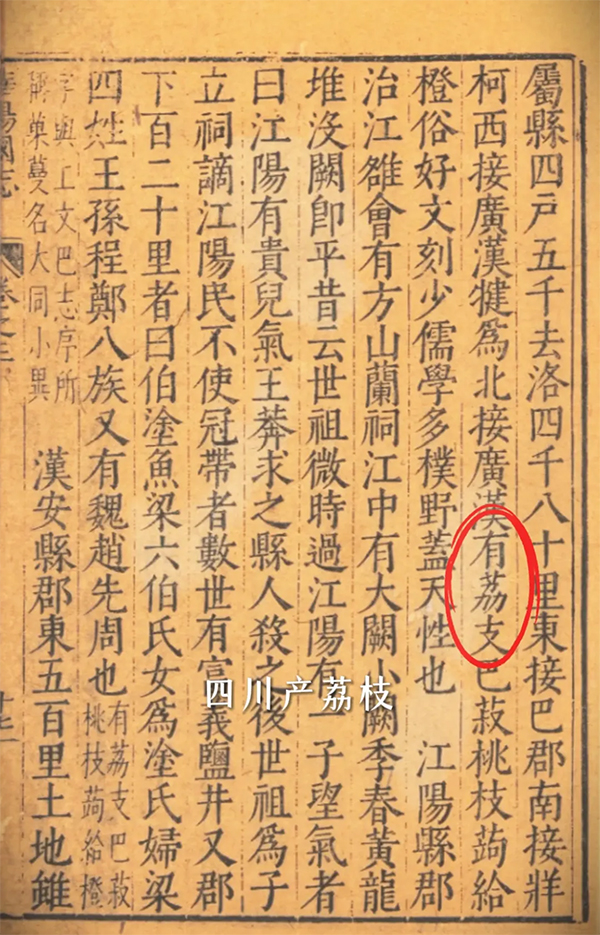With the artistic reconstruction of historical scenes in film and television dramas, the origin of the lychees that Yang Guifei tasted in the line “A steed which raised red dust won the fair mistress' smiles” has become a hot topic among netizens.
Tracing back to ancient classics and considering factors such as distance, climate, and regional specialties, it is highly likely that Yang Guifei, who was born in Shu, favored lychees from the Shu region. Moreover, given the much shorter distance compared to Lingnan, "Sichuan lychees" were most likely her better choice.
“West of the Jin River gleams with mist; lychees ripen on the hill after rain.”The imagery and scenery in this poem by Tang Dynasty poet Zhang Ji, isn’t this the most vivid portrayal of lychees growing near Chengdu?

Records of Lychees in“Huayang Guozhi”
Did Sichuan really produce lychees? Absolutely. In ancient times, Sichuan not only had lychees but also many other “tropical specialties” in the Sichuan Basin and Chengdu Plain, which were in a relatively warm and humid subtropical climate during the Tang Dynasty.
Chang Qu, a historian of Eastern Jin Dynasty, recorded in “Huayang Guozhi” that the Chengdu Plain, geographically characterized by the Min River being regarded as the source of the Yangtze River, was rich not only in metals and jade but also in typical tropical animals such as rhinoceroses and elephants.
Thanks to its abundant resources and favorable climate, the local culinary preferences leaned toward “rich blend of tastes” and "spicy flavors", with people adding uniquely flavored plants to their dishes which is a tradition that remains a defining feature of Sichuan cuisine today.
Meanwhile, as recorded in “Huayang Guozhi”, “in its mountains and forests, there is prey; in its rivers, fish and shrimp; in its orchards, melons and fruits ripen all year round,” which means that the diverse selection of vegetables and fruits also enriched the dining tables of the people in Sichuan.
1、“國際在線”由中國國際廣播電臺主辦。經中國國際廣播電臺授權,國廣國際在線網絡(北京)有限公司獨家負責“國際在線”網站的市場經營。
2、凡本網註明“來源:國際在線”的所有信息內容,未經書面授權,任何單位及個人不得轉載、摘編、複製或利用其他方式使用。
3、“國際在線”自有版權信息(包括但不限于“國際在線專稿”、“國際在線消息”、“國際在線XX消息”“國際在線報道”“國際在線XX報道”等信息內容,但明確標注為第三方版權的內容除外)均由國廣國際在線網絡(北京)有限公司統一管理和銷售。
已取得國廣國際在線網絡(北京)有限公司使用授權的被授權人,應嚴格在授權範圍內使用,不得超範圍使用,使用時應註明“來源:國際在線”。違反上述聲明者,本網將追究其相關法律責任。
任何未與國廣國際在線網絡(北京)有限公司簽訂相關協議或未取得授權書的公司、媒體、網站和個人均無權銷售、使用“國際在線”網站的自有版權信息産品。否則,國廣國際在線網絡(北京)有限公司將採取法律手段維護合法權益,因此産生的損失及為此所花費的全部費用(包括但不限于律師費、訴訟費、差旅費、公證費等)全部由侵權方承擔。
4、凡本網註明“來源:XXX(非國際在線)”的作品,均轉載自其它媒體,轉載目的在於傳遞更多信息,豐富網絡文化,此類稿件並不代表本網贊同其觀點和對其真實性負責。
5、如因作品內容、版權和其他問題需要與本網聯繫的,請在該事由發生之日起30日內進行。